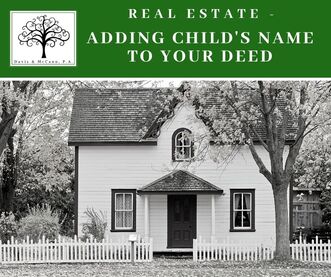 Q: I want to add my child’s name to the title of my home, so they can keep the house out of probate and receive my home quickly after my death. Do you see any concerns with my plan? A: The answer to your question is a solid “maybe”. Your personal circumstances will dictate whether this estate planning strategy is the best move for you. Adding your child’s name to your deed could speed the transfer of your home to your beneficiaries and keep it out of probate. But, before you run off and put your child’s name on the title of your house you should consider a few of these risks. Gift Taxes. By adding your child to the title of your home, you have made a gift that is subject to gift taxes. The gift is likely far below the current federal gift tax exclusion amount, so you shouldn’t have to pay gift taxes. However, you may need to file a gift tax return if the gift is over the annual exclusion amount. Medicaid benefits. If you need KanCare (Medicaid) assistance to pay for nursing home care within 5 years of adding your child’s name to the deed, you could be penalized when requesting benefits. Child’s Death. If your child dies before you, his/her interest in your home becomes part of his/her estate. This interest in your home will be subject to his/her liabilities and would pass to his/her beneficiaries as named in your child’s estate plan. Someone you don’t know or trust could become the new co-owner of your home. Disagreements. If you decide to sell the house and move, your child could legally refuse to transfer ownership back to you. Also, if your child wants to sell your home, that child could force a partition action, a sale of the real estate done through the court. Child’s creditors. If your child is involved in a serious accident, your house could have a lien placed on it to cover his/her debts not covered by insurance. Similarly, if your child is a joint owner, the value of the home could be subject to his/her creditors, should they face bankruptcy or credit issues. Child’s divorce. If your child gets a divorce after being added to your deed, his/her interest in your house may be part of the divorce settlement. Capital gains tax. If you sell the home after adding your child to the deed, your child may encounter unintended capital gains tax problems. No legal obligation. If you add one child’s name to the deed and instruct him/her to share the proceeds from the sale of the home with your other children after your death, they may not be legally obligated to do so. Your other children could be cut out of the inheritance that you intended for them to have. The type of ownership that you give to your child is a very important factor in your considerations. Should you establish a joint tenancy with rights of survivorship (JTWROS), a tenancy in common (TOC), or perhaps you should do a transfer on death deed? Consulting an experienced estate planning attorney prior to adding anyone to your deed will inform you of the pros and cons of each option, as it relates to your personal circumstance. Without adequate counsel, the complications that could arise from such a move may outweigh any possible benefits. For more information on estate planning, probate or real estate matters, contact Davis & McCann, P. A., Dodge City, KS. We are members of Wealth Counsel, a national consortium of Estate Planning Attorneys and Elder Law. We focus our practice on providing clients with the best legal advice on Estate Planning, Probate, Trust Administration, Medicaid and Long-term Care Planning, Family Business/Small Business Succession Planning, Real Estate Transactions, 1031 Exchanges, and related matters. Comments are closed.
|
NEWS YOU CAN USEDavis & McCann, P. A., Archives
April 2021
Categories
All
|

 RSS Feed
RSS Feed